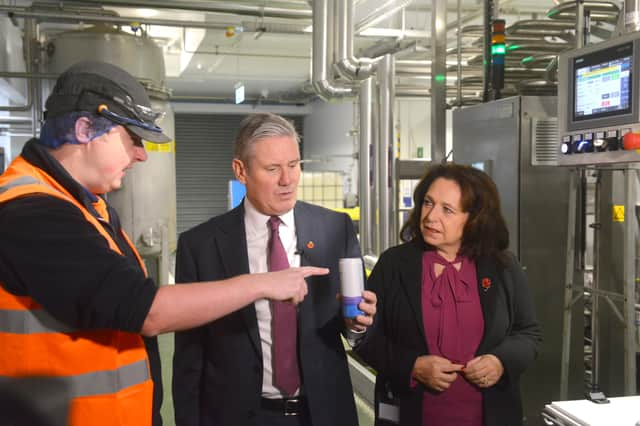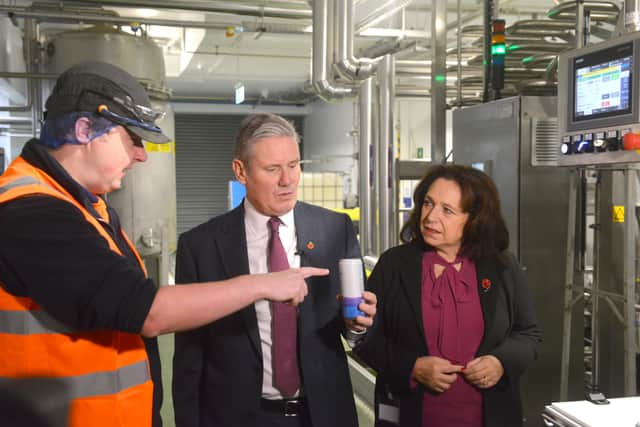Sunderland and Durham MPs defy Labour leader Sir Kier Starmer over Palestine ceasefire vote


Six North East MPs - including Sunderland Central's Julie Elliott - have defied the party line over calls for a ceasefire in Gaza.
Sir Keir Starmer lost eight frontbenchers after he suffered a major rebellion in a Commons vote last night.
Advertisement
Hide AdAdvertisement
Hide AdAlmost 60 of the party's MPs defied a party order not to support an SNP amendment to the King’s Speech..


MPs voted 293 to 125, a majority of 168, to reject the amendment calling for “all parties to agree to an immediate ceasefire” in Gaza.
But 56 Labour MPs backed the position, rejecting their party leader’s stance.
Four shadow ministers - Jess Phillips, Yasmin Qureshi, Afzal Khan and Paula Barker - quit on Wednesday evening.
Advertisement
Hide AdAdvertisement
Hide AdAs well as Julie Elliott, North East MPs voting for the amendment were Easington's Grahame Morris, South Shields' Emma Lewell-Buck, Gateshead's Ian Mearns, Jarrow's Kate Osborne and Durham City MP Mary Foy.
Ms Foy resigned from her position as Parliamentary Private Secretary to deputy leader Angela Rayner in order to vote against the party's ruling.
Labour MPs had been ordered to abstain on the SNP move and were told instead to back Sir Keir’s position calling for longer “humanitarian pauses” rather than a ceasefire.
In a statement following the vote, Sir Keir said he regretted that party colleagues had not backed his position: "Alongside leaders around the world, I have called throughout for adherence to international law, for humanitarian pauses to allow access for aid, food, water, utilities and medicine, and have expressed our concerns at the scale of civilian casualties.
Advertisement
Hide AdAdvertisement
Hide Ad"Much more needs to be done in this regard to ease the humanitarian crisis that is unfolding in Gaza.
"And in addition to addressing the present, every leader has a duty not to go back to a failed strategy of containment and neglect, but to forge a better and more secure future for both Palestinians and Israelis.
"I regret that some colleagues felt unable to support the position tonight. But I wanted to be clear about where I stood, and where I will stand."
The scale of the rebellion will be a blow to Sir Keir, who had hoped to avoid further damaging splits within his parliamentary party over the issue.
Advertisement
Hide AdAdvertisement
Hide AdThe party has been riven with internal divisions over Israel’s response to the deadly incursion by Hamas that sparked the conflict.
The leadership has backed the UK Government’s position of pushing for humanitarian pauses in the fighting to allow aid to reach Palestinians trapped in the bombarded territory but has stopped short of calling for a total cessation of hostilities.
Peter Kyle, the shadow science secretary, defended the decision to impose a strict three-line whip - the most severe form of party order - for the amendment rather than allowing a free vote.
"Just because it’s an international policy doesn’t mean that it’s not a policy that we should stick together on as a team," he told ITV’s Peston programme.
Advertisement
Hide AdAdvertisement
Hide Ad"We’ve seen Keir engaging with people from all communities, all traditions within the Labour Party. He has allowed people to speak out on these issues. So we have allowed as a party a very broad debate.
"But there are key times, if you are the party that seeks to run the country and you want to be the prime minister of our country standing on the international stage, where you have to show that we are a united party that can resolve itself in Parliament and the government."
Comment Guidelines
National World encourages reader discussion on our stories. User feedback, insights and back-and-forth exchanges add a rich layer of context to reporting. Please review our Community Guidelines before commenting.